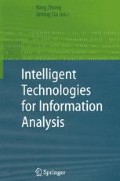Abstract
The importance of domain ontologies is widely recognized, particularly in relationship to the expected advent of the so-called Semantic Web. An ontology is an infrastructure able to provide a precise account of the concepts characterizing a given application domain. It represents a shared understanding of a given reality, thus fostering better communication and cooperation among users, and interoperability among systems. Despite the significant amount of work in the field, ontologies are still scarcely used in Web-based applications. One of the main problems is the difficulty in defining the content, i.e., the identification and definition of relevant concepts in the domain. The solution proposed in this chapter starts from the idea that the corpus of documents produced by a community is the most representative (although implicit) repository of concepts. We present a method and a tool, OntoLearn — aimed at the extraction of knowledge from Web-sites and, more generally, from documents shared among the members of virtual organizations — to support the construction of a domain ontology.
Access this chapter
Tax calculation will be finalised at checkout
Purchases are for personal use only
Preview
Unable to display preview. Download preview PDF.
References
R. Basili, M.T. Pazienza, P. Velardi: An Empirical Symbolic Approach to Natural Language Processing. Artificial Intelligence, 85, pp. 59–99 (1996)
T. Berners-Lee: Weaving the Web ( Harper, San Francisco, 1999 )
C. Fellbaum: WordNet: an electronic lexical database (Cambridge, MIT press,1995)
S. Harabagiu, D. Moldovan: Enriching the WordNet Taxonomy with Contextual Knowledge Acquired from Text. AAAI/MIT Press, 1999
D.B. Lenat: CYC: a large scale investment in knowledge infrastructure. Communication of the ACM, 3 (11) (1993)
R. Krovetz: Homonymy and polysemy in Information Retrieval. Proceedings of ACL/EACL 1997
A. Maedche, S. Staab: Semi-automatic Engineering of Ontologies from Text. Proceedings of the Twelfth International Conference on Software Engineering and Knowledge Engineering (SEKE’2000)
A. Maedche, S. Staab: Learning Ontologies for the Semantic Web. Proceedings of the 2nd International Workshop on the Semantic Web, Hongkong, China, May 2001
R. Milhalcea, D. Moldovan: eXtended WordNet: progress report. NAACL 2001Workshop on WordNet and Other Lexical Resources, Pittsbourgh, June 2001
M. Missikoff, X.F. Wang: Consys-A Group Decision-Making Support SystemFor Collaborative Ontology Building. In: Proc. of Group Decision and Negoti-ation 2001 Conference, La Rochelle, France, 2001
M. Missikoff: OPAL-A Knolwedge-Based Approach for the Analysis of Complex Business Systems (LEKS, IASI-CNR, Rome, 2000 )
E. Morin: Automatic Acquisition of semantic relationships between terms from technical corpora. Proc. of 5th International Congress on Terminology and Knowledge extraction, TKE-99, 1999
B. Smith, C. Welty: Ontology: towards a new synthesis, Formal Ontology in Information Systems (ACM Press, 2001 )
M. Uschold, M. Gruninger: Ontologies: Principles, Methods and Applications. The Knowledge Engineering Review, 11 (2) (1996)
P. Velardi, M. Missikoff, R. Basili: Identification of relevant terms to support the construction of Domain Ontologies. A CL-EACL Workshop on Human Language Technologies, Toulouse, France, July 2001242 R. Navigli, P. Velardi, M. Missikoff
P. Velardi, M. Missikoff, P. Fabriani: Using Text Processing Techniques to Automatically enrich a Domain Ontology. Proc. of ACM Conf. On Formal Ontologies and Information Systems, ACM FOIS, Ogunquit, Maine, October 2001
P. Vossen: Extending, Trimming and Fusing WordNet for Technical Documents. NAACL 2001 workshop on WordNet and Other Lexical Resources, Pittsbourgh, July 2001
T. Yokoi: The EDR electronic dictionary. Communications of the ACM, 38 (11) (1993)
DAML+OIL. http://www.daml.org
ECAI-2000 1st Workshop on Ontology Learning. http://o12000.aifb.uni-karlsruhe.de
EuroWordNet. http://www.hum.uva.nl
Fetish EC project ITS-13015. http://fetish.singladura.com
Harmonise EC project IST-2000–29329. http://dbs.cordis.lu
IJCAI-2001 2nd Workshop on Ontology Learning. http://o12001.aifb.uni-karlsruhe.de
Semantic Web Community Portal.http://www.semanticweb.org
SemCor The semantic concordance corpus. http://mind.princeton.edu
SymOntos, a symbolic ontology management system. http://www.symontos.org
WordNet 1.6. http://www.cogsci.princeton.edu/~wn/w3wn.html
RDF. http://www.w3c.org/RDF/
Author information
Authors and Affiliations
Rights and permissions
Copyright information
© 2004 Springer-Verlag Berlin Heidelberg
About this chapter
Cite this chapter
Navigli, R., Velardi, P., Missikoff, M. (2004). Web Ontology Learning and Engineering: An Integrated Approach. In: Intelligent Technologies for Information Analysis. Springer, Berlin, Heidelberg. https://doi.org/10.1007/978-3-662-07952-2_10
Download citation
DOI: https://doi.org/10.1007/978-3-662-07952-2_10
Publisher Name: Springer, Berlin, Heidelberg
Print ISBN: 978-3-642-07378-6
Online ISBN: 978-3-662-07952-2
eBook Packages: Springer Book Archive

